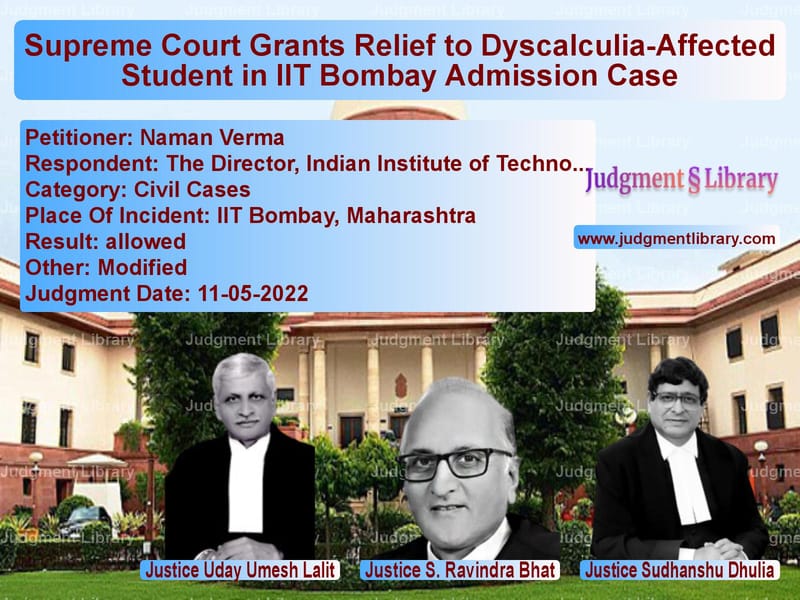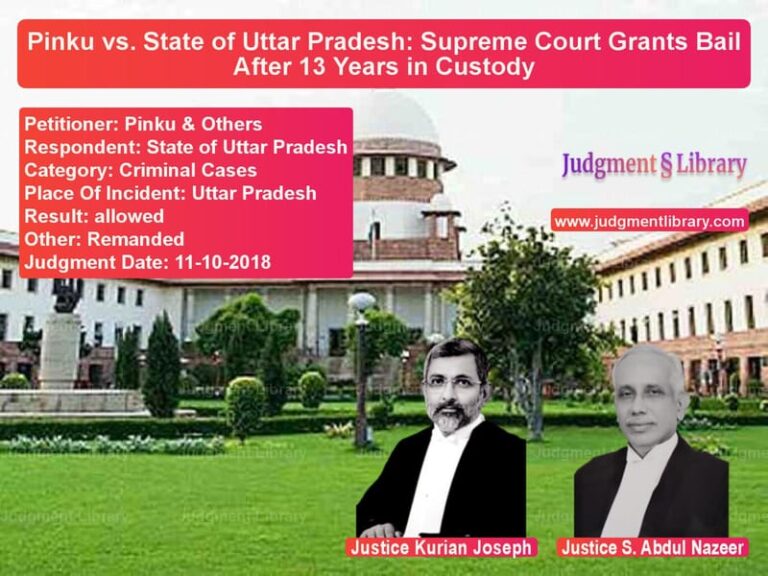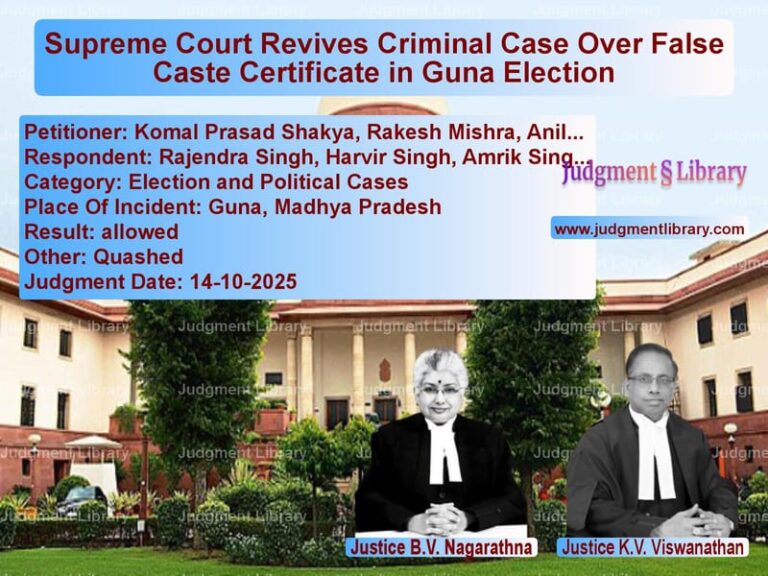Supreme Court Grants Relief to Dyscalculia-Affected Student in IIT Bombay Admission Case
The case of Naman Verma vs. The Director, Indian Institute of Technology Bombay & Others revolved around the denial of admission to a student suffering from Dyscalculia (a learning disability affecting mathematical ability) and the subsequent legal battle that ensured his right to education. The Supreme Court invoked Article 142 of the Constitution to allow the appellant to retain his Master of Design degree, even though his eligibility under the disability laws was contested.
Background of the Case
Naman Verma, the appellant, applied for admission to the Master of Design (M.Des) course at IIT Bombay. He claimed that he suffered from a learning disability known as Dyscalculia, which made it difficult for him to process numerical and mathematical information. His application for admission was initially rejected on the ground that Dyscalculia was not explicitly recognized under the Persons with Disabilities (Equal Opportunities, Protection of Rights and Full Participation) Act, 1995.
Challenging this rejection, Verma filed Writ Petition No. 6818 of 2013 before the Bombay High Court, seeking directions to allow his admission into the course under the disability quota. The High Court, through interim orders, permitted him to pursue the course while his case was being adjudicated.
Key Legal Issues
- Whether Dyscalculia qualifies as a recognized disability under Indian disability laws.
- Whether an institution like IIT Bombay can be directed to admit students under the disability category when a specific condition is not explicitly mentioned in the law.
- What should be the status of a student who has already completed the course under interim judicial relief?
- Whether the judgment should be influenced by the Rights of Persons with Disabilities Act, 2016, which replaced the 1995 Act.
Arguments Presented
Petitioner’s Arguments (Naman Verma)
- He suffered from Dyscalculia, a recognized learning disability, which significantly impacted his mathematical abilities.
- The 1995 Act was outdated in its definitions of disabilities, and his condition should have been considered under its broader interpretation.
- Under interim relief from the Bombay High Court, he was permitted to complete the Master of Design course, and it would be unfair to invalidate his degree now.
- The enactment of the Rights of Persons with Disabilities Act, 2016, expanded the scope of recognized disabilities and included conditions like Specific Learning Disabilities, which should now cover Dyscalculia.
Respondents’ Arguments (IIT Bombay & Others)
- The institution followed the eligibility criteria laid out by the law at the time of admission, and Dyscalculia was not a recognized disability under the 1995 Act.
- The reservation for persons with disabilities was limited to conditions specifically mentioned in the statute.
- Allowing an exception in this case would set a problematic precedent for other admissions, leading to subjective interpretations of disability criteria.
- The High Court had ruled against the appellant on points of law, confirming that he was not eligible under the disability quota.
Supreme Court’s Observations
The Supreme Court reviewed the judgment of the Bombay High Court and acknowledged that while the High Court correctly applied the law as it stood at the time, the practical reality of the case demanded special consideration. The key observations included:
- The student had already completed the course: Since Verma had pursued and completed his Master of Design degree under interim judicial relief, canceling his candidature at this stage would be unjust.
- The new disability law (2016 Act) provided broader protections: Although not applicable retroactively, the new law recognized Specific Learning Disabilities under which Dyscalculia could be included.
- Article 142 powers were invoked: The Court exercised its discretionary powers to grant full academic validity to Verma’s qualification, ensuring fairness.
- Educational institutions should re-evaluate their criteria: The judgment encouraged institutions like IITs to develop policies that accommodate a broader range of disabilities in the future.
Key Excerpts from the Judgment
The Supreme Court ruled:
“We, therefore, exercise our power under Article 142 of the Constitution of India and declare that the appellant has successfully completed the course of Master in Design and that the qualification shall hold good for all practical purposes hereafter.”
The Court further observed:
“The judgment rendered by the High Court on questions of law is affirmed, and as and when the entitlement of the appellant under the provisions of the 2016 Act is to be considered, the same shall be considered purely in accordance with law.”
Final Verdict
The Supreme Court issued the following directives:
- The appellant’s degree shall remain valid, and he shall be deemed to have successfully completed the course.
- The High Court’s ruling on legal issues was affirmed, meaning that IIT Bombay was not legally bound to admit candidates under the disability quota unless their condition was specifically recognized.
- However, considering the broader scope of disabilities under the 2016 Act, similar cases in the future should be assessed in accordance with the revised legal framework.
- The institution was directed to hand over the degree and all related testimonials to the appellant within four weeks.
Outcome: This ruling balances legal technicalities with practical fairness, ensuring that students who have completed their education under judicial protection are not unfairly penalized while upholding the principle that disability laws should be interpreted strictly within their statutory framework.
Petitioner Name: Naman Verma.Respondent Name: The Director, Indian Institute of Technology Bombay & Others.Judgment By: Justice Uday Umesh Lalit, Justice S. Ravindra Bhat, Justice Sudhanshu Dhulia.Place Of Incident: IIT Bombay, Maharashtra.Judgment Date: 11-05-2022.
Don’t miss out on the full details! Download the complete judgment in PDF format below and gain valuable insights instantly!
Download Judgment: naman-verma-vs-the-director,-indian-supreme-court-of-india-judgment-dated-11-05-2022.pdf
Directly Download Judgment: Directly download this Judgment
See all petitions in Education Related Cases
See all petitions in Consumer Rights
See all petitions in Judgment by Uday Umesh Lalit
See all petitions in Judgment by S Ravindra Bhat
See all petitions in Judgment by Sudhanshu Dhulia
See all petitions in allowed
See all petitions in Modified
See all petitions in supreme court of India judgments May 2022
See all petitions in 2022 judgments
See all posts in Civil Cases Category
See all allowed petitions in Civil Cases Category
See all Dismissed petitions in Civil Cases Category
See all partially allowed petitions in Civil Cases Category







